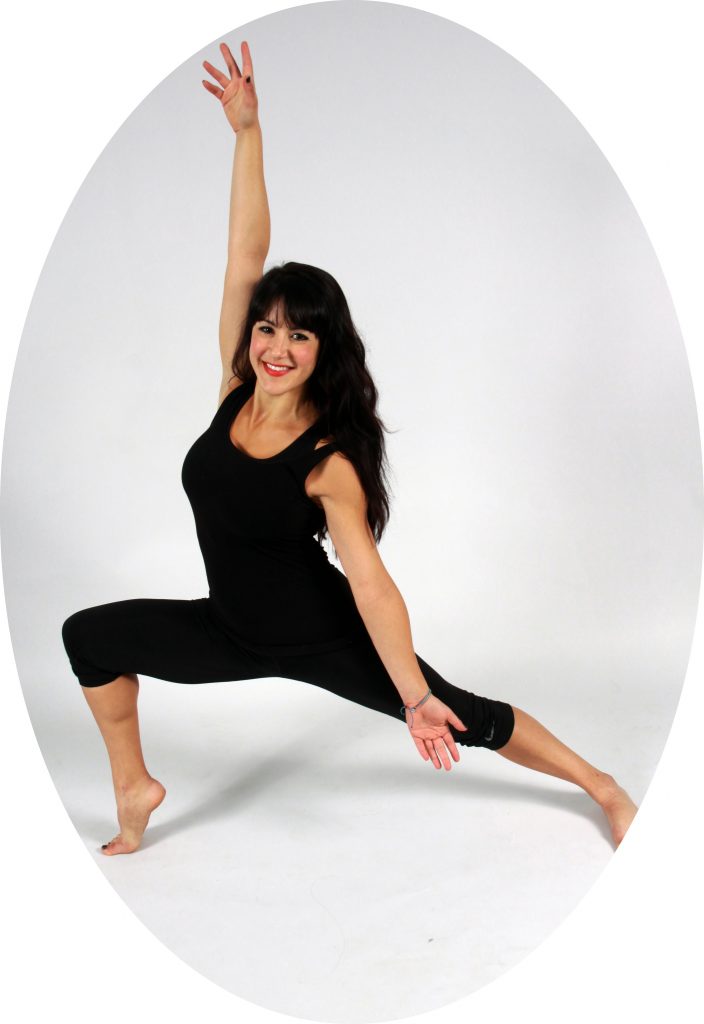 Listen. I hope you’re working out. REGULARLY. And don’t be that New Year’s Resolution guy (or girl) saving up your healthy eating and exercise regimen for January 1st. Take care of yourself NOW. Also, if you go longer than 2 weeks without exercising you will start to have declined strength and endurance and will probably be in a bad mood. Plus, once you start your workouts again you will feel much more sore and weak which reduces the joy of the workout (which often leads to people stopping exercise again). I know you.
Listen. I hope you’re working out. REGULARLY. And don’t be that New Year’s Resolution guy (or girl) saving up your healthy eating and exercise regimen for January 1st. Take care of yourself NOW. Also, if you go longer than 2 weeks without exercising you will start to have declined strength and endurance and will probably be in a bad mood. Plus, once you start your workouts again you will feel much more sore and weak which reduces the joy of the workout (which often leads to people stopping exercise again). I know you.
In saying that, today we are talking about how to stop muscle soreness from getting out of hand after a kick butt workout in part because of FOOD. Yes, food (of course the other part of the equation is proper warm up, cool down, stretching, and rest)! Certain foods and timing of eating can make you feel less ouchy and recover a bit sooner. The power of food is really incredible. I hope you get to feel a bit of that magic too…so here goes!
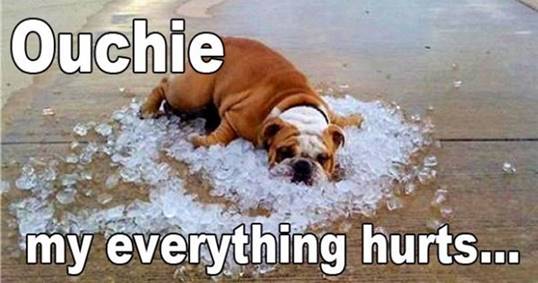
Timing

There’s a smallish window of opportunity to capitalize on refueling after a workout. It’s about 1 hour. Thirty minutes is ideal based on the research. If you wait too long to eat, you will delay the refueling process in trying to rebuild muscles and restore glycogen and will probably feel tired muscles the next time you try to work out. You will not prevent muscle soreness this way. If you work out often and refuel slowly, you might start dreading your exercise because of that nasty fatigue. Bad news!
Protein

For ideal recovery, try to get 15-40 grams of protein (will vary from person to person based on weight and exercise type/intensity) within 30 minutes (an hour at the latest). In a day I recommend getting 1-1.8 grams of protein per kilogram of body weight (divide your weight in pounds by 2.2 and multiply by 1-1.8).
Carbohydrates

Yep. You need carbs. Your body’s glycogen supply (carbohydrate storage) is used as fuel during exercise, and consuming carbs after your workout helps replenish them. The rate at which your glycogen stores are used depends on the activity (in high intensity training, you use more). For this reason, if you participate in endurance sports (running, swimming, etc.), you need to consume more carbs than a bodybuilder. Shoot for 0.5–0.7 grams of carbs per pound (1.1–1.5 grams/kg) of body weight within 30 minutes (optimum) after training.
Furthermore, insulin secretion, which promotes glycogen synthesis (creation), is better stimulated when carbs and protein are consumed at the same time.
The best carbohydrate-to-protein ratio for a post workout nutrition is 3:1 (3 grams of carbohydrate for every 1 gram of protein). An example: 40 grams of protein and 120 grams of carbs.
Eating plenty of carbs to rebuild glycogen stores is most important for people who exercise often, such as twice in the same day. If you have 1 or 2 days to rest between workouts, then this becomes less important.
See below for more body soothing food examples of this 3:1 ratio:
If You Don’t Want to Chew Food After a Workout: Tart Cherry Protein Shake
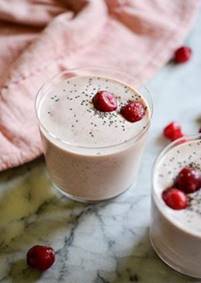
For a refreshing, protein-packed drink to refuel worn out muscles, mix two scoops of a clean protein powder with a splash of tart cherry juice, some fruit and veggies of choice, and wallah. Research on professional athletes has shown that tart cherry juice can help improve recovery time, decrease muscle pain, and reduce muscle damage compared with other beverages.
If You Want a Breakfast-y Meal After Your Workout: Scrambled Eggs and Veggies in a Whole-Wheat Pita with Tumeric (Choose Tofu Instead Of Eggs To Make This Vegan)
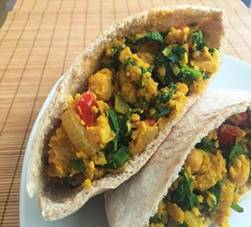
Eggs deliver the highest quality protein, making them one of the best foods to eat after a sweat session. Scramble up two large eggs and you’ll get 13 grams of protein. While you’re at it, toss in a handful of chopped onions, peppers, and mushrooms for extra vitamins and phytonutrients to speed muscle repair. Serve it in a whole-wheat pita pocket and you’ll score six additional grams of protein, plus 36 grams of carbohydrates to replenish depleted glycogen. Don’t forget nature’s gold! Research on turmeric’s active ingredient found that a curcumin supplement helped reduce the pain associated with delayed onset muscle soreness, reduced injury, and improved recovery of muscle performance.
If You Want Just a Snack After Your Workout: Greek Yogurt, Oatmeal, Honey, and Banana
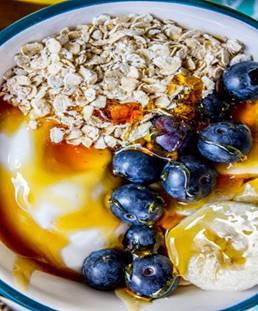
If you’re looking for a snack to help you recover, a Greek yogurt parfait is a perfect choice. A single-serve container of non-fat plain Greek yogurt provides 17 grams of protein along with nearly 20 percent of your daily calcium, a mineral that’s lost during prolonged sweating. Simply combine the yogurt with one scoop of Whey Protein powder and one teaspoon of honey and mix well. Top with a banana, fresh berries, and a scoop of oatmeal for a healthy dose of energizing protein and carbs. Bananas are an easy-to-digest source of quality carbohydrates that help spike your insulin just enough to drive protein into the muscle to stimulate muscle rebuilding and growth. They’re also one of the best sources of the electrolyte potassium, which research suggests may help reduce muscle soreness post gym.
If You Just Sweat a Ton: Salmon Spinach Salad With Nuts, Seeds, And Watermelon

There’s nothing quite as refreshing as biting into a cold, juicy piece of watermelon after a serious sweat session. But research on watermelon’s key amino acids, l-citrulline, suggests it might also soothe those sore muscles too! One study found that giving athletes watermelon juice which contains the rind (the highest source of l-citrulline) after workout helped reduce recovery heart rate and muscle soreness after 24 hours. The natural sugars will also help drive protein into the muscles and replenish low glycogen stores, while the high water content is essential to preventing muscle-cramping dehydration.
Salmon is loaded with anti-inflammatory omega-3 fats, antioxidants, and muscle-building protein; salmon is a close-to-perfect post-workout food. Research on omega-3 consumption in athletes suggests that it may specifically help prevent DOMS, inflammation, and muscle soreness after exercises like a bicep curl. Spinach is one of the most popular superfoods out there, and for good reason. This antioxidant powerhouse fights free radicals in your body to not only prevent serious diseases like cancer and heart disease, but to also quickly rebound from strenuous exercise. It’s also an excellent diet staple for promoting good health and strengthening your muscles (it has to do with its nitrates). Spinach is packed with magnesium, which helps maintain normal muscle and nerve function, and has also been shown to help regulate blood sugar and blood pressure to boot. Nuts and seeds provide essential Omega-3 fatty acids to fight inflammation, protein for muscle synthesis and growth, electrolytes for adequate hydration, and zinc to boost immunity (just to name a few).
If you exercise at night: Cottage Cheese and Sweet Potato
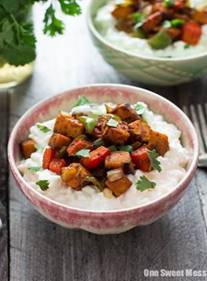
If you usually exercise at night, try snacking on a cup of cottage cheese afterward. Cottage cheese is packed with sodium to replenish lost electrolytes, so it’s great for supporting hydration. It also contains casein (in addition to some whey), a form of protein that’s digested slowly, making it a perfect before-bedtime protein source among athletes. With an impressive 28 grams of protein per cup, think of it as a smart strategy to feed your muscles while you sleep. A lot of bang for your buck! One study found that when athletes worked out in the evening and were given casein protein shortly before bed, they saw a spike in muscle synthesis compared to a placebo. Plus, the unique branched-chain amino acid, leucine, found in abundance in cottage cheese, has been specifically found to speed recovery and pain. Cottage cheese is also packed with live cultures (good bacteria) that helps break down and absorb nutrients that can help make you bigger and stronger in addition to supporting your immunity. Sweet potatoes replenish glycogen stores, which become depleted after a tough workout, and are a great source of beta carotene and vitamin C to keep your body healthy and strong.
If you need a boost: Coffee with Cacao and Cinnamon
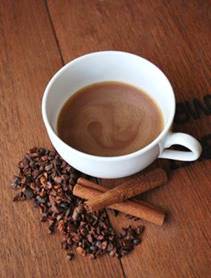
Good news for coffee lovers. Research suggests that a moderate dose of caffeine (about 2 cups of coffee) can reduce post-workout pain by 48 percent! Another study found that when caffeine was given along with other pain-relieving pharmaceuticals, 40 percent fewer drugs were needed to provide the same level of relief. Research found that when compared with a placebo group, trained women who were given cinnamon or ginger described having significantly less muscle soreness after working out. Cacao has high levels of antioxidants, magnesium, and B-vitamins to reduce stress in our bodies related to exercise, to balance electrolytes, and to boost energy levels. Those antioxidants, called flavanols, are even able to boost the production of nitrous oxide in your body, causing your blood vessel walls to relax and open, lowering blood pressure and promoting overall health. Add some cacao nibs to your coffee or smoothie!
Hydration:

Adequate fluid intake before, during, and after exercise is important for health and optimal performance. Dehydration actually decreases exercise performance. In the hours after exercise, clients should aim for approximately 16 to 24 ounces of fluid for every pound (0.5 kg) of body weight lost during exercise to replenish fluids. You can also hydrate with some Green tea which is abundant in anti-inflammatory antioxidants, making it the ideal pre- or post-workout drink to prevent muscle and cell damage related to exercise. Drink it hot or cold!
If you’ve managed to read through all of this, can you now see the magical healing qualities of food?! (You must also warm up, cool down, and rest properly.)
So… after your kick-ass workout, make sure you refuel intelligently (and tell me about it).
Healing love,
Miriam Turner
Studio SWEAT Dietitian
Resources:
http://www.nutritionnews.abbott/strength-muscle/5-post-workout-snacks-for-muscle-building-and-energy.html
https://greatist.com/eat/foods-for-sore-muscles
https://www.acefitness.org/education-and-resources/professional/expert-articles/5390/pre-and-post-workout-nutrition-for-strength-training
http://www.coreperformance.com/daily/nutrition/20-simple-workout-snacks.html




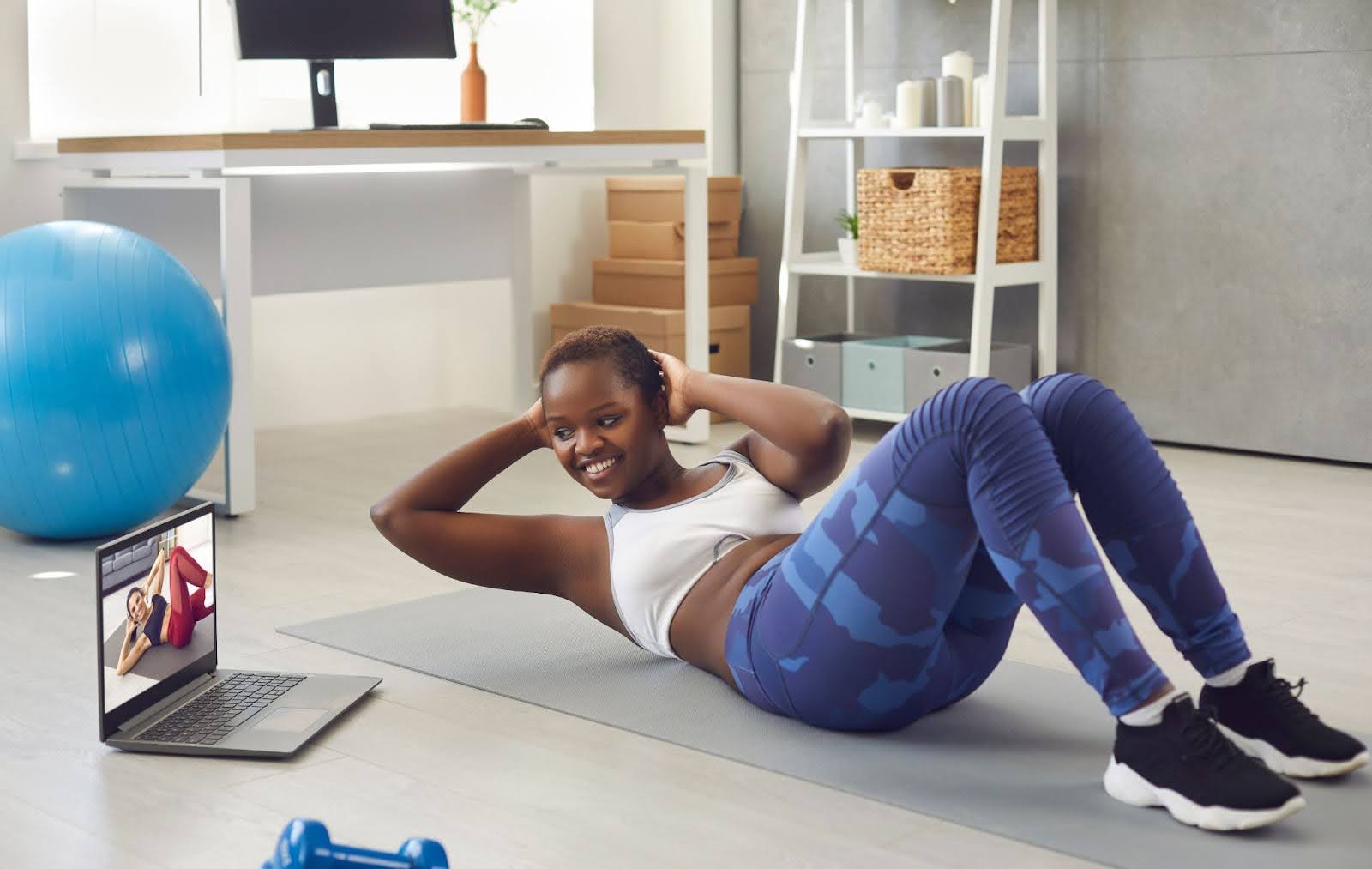




Comments - 0